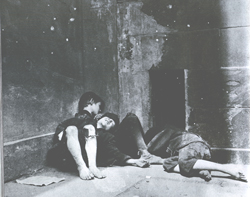

Nineteenth century society consistently tolerated the ill treatment of children. People viewed cruelty to children as an inevitable and unremarkable fact of life. Elements of violence and abuse existed even in the best of homes. Infanticide and the abandonment of infants and toddlers was an everyday occurrence. "Baby farming," in which parents "farmed out" their infants to others for care, often with disastrous results, was an accepted arrangement. Beatings and other physical and emotional punishments were considered to be an effective way of instilling virtue in children. People were reluctant to interfere in the private family business of their neighbors and routinely failed to act in situations where punishments were too harsh and resulted in serious injury or even death.
The April 1874 case of Mary Ellen Wilson illustrates the lack of consideration for, and protection of, children in nineteenth century society. A charity worker was alerted to the severe abuse eight year old Mary Ellen was suffering in the home of her "step mother." The charity worker could not have Mary Ellen removed from the home, as there was no existing legal means to do so. The only alternative left to the charity worker was to have Mary Ellen's step mother prosecuted for abuse under existing laws prohibiting cruelty to animals. In effect, Mary Ellen had to be classified as an animal before any existing legislation could be used to protect her from the abuse she was suffering at the hands of her step mother. As a result, the first child abuse case in New York City was prosecuted under cruelty to animal laws. It would appear that animals were deemed worthy of protection in nineteenth century society, yet children were not. This situation was remedied in December 1874 with the establishment of the New York Society for the Prevention of Cruelty to Children.
The Children's Aid Society did not knowingly place children in harmful, abusive situations. The society simply accepted, or chose to ignore, the possibility that some foster families might be abusive to the children placed in their homes. Brace believed that the children he was placing out had been living in "absolutely desperate conditions" in New York City, and would have argued that although some of the placements did not work out as intended, at least these children had been given an opportunity to have a better life.